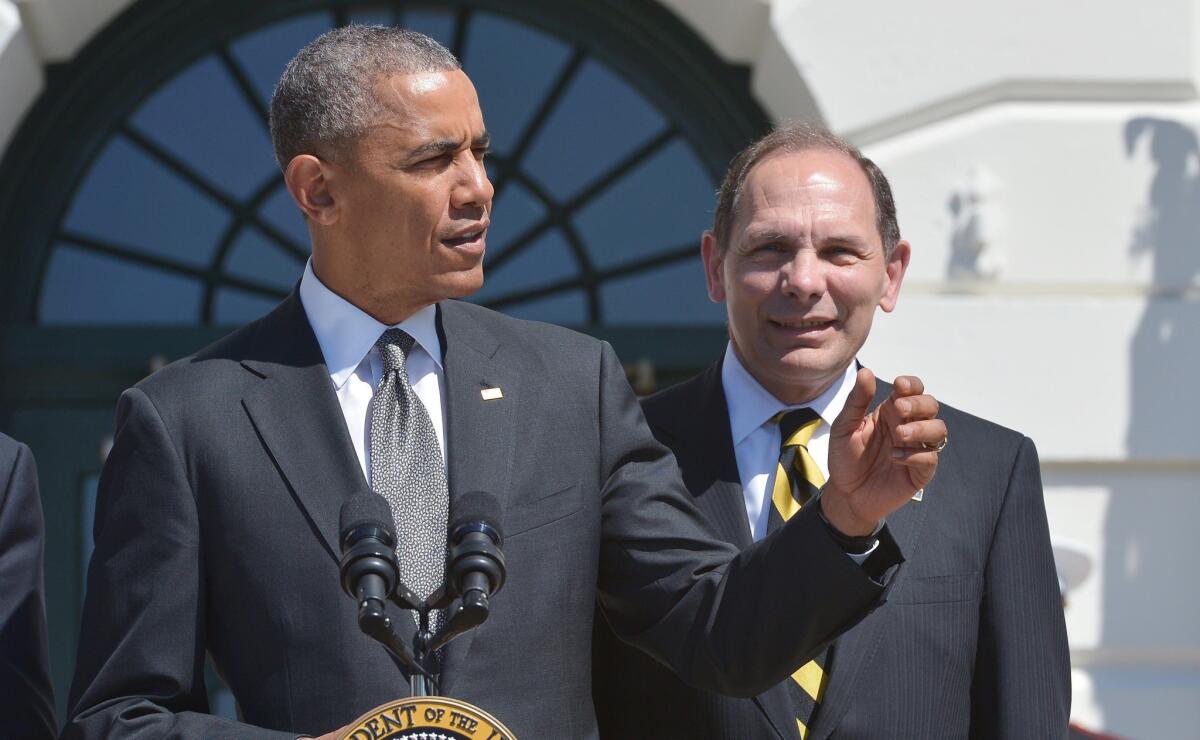Bipartisan deal would give Obama fast-track authority on trade pact

A bipartisan bill unveiled Thursday would let President Obama strike a trade deal knowing that Congress must approve or reject it with no amendments.
- Share via
Congressional leaders unveiled a bipartisan bill Thursday that is likely to ease passage of a contentious Pacific Rim trade deal that has been a top foreign policy goal of President Obama’s second term.
Proponents say the proposed, 12-nation trade deal, known as the Trans-Pacific Partnership, will deliver sweeping economic benefits to West Coast ports in California and an array of U.S. industries, including entertainment companies and drug makers.
But while Republicans generally favor speeding up the path to a trade agreement, key Democrats and major unions are worried about the impact to American jobs, opening up a political rift between the White House and congressional Democrats.
The so-called fast-track legislation, introduced jointly in the House and Senate, would make it easier for Obama to take a big step in bringing long-delayed Trans-Pacific Partnership talks to a conclusion, providing assurances that once the deal is reached, Congress must approve or reject it with no amendments.
Having fast-track authority is seen as necessary for the Obama administration to wrap up the deal and alleviate concerns of other Pacific-Rim countries, including Japan, Canada and Mexico.
House and Senate committee leaders had been wrangling for months over fast-track authority. To win passage of the bill, Obama will need to overcome deep resistance from many in his own party as well as reluctance from some Republicans, particularly in the House, who complain the president has already exceeded his executive authority and should not be given new powers.
Obama vowed to take congressional concerns into consideration, but stressed that the trade pact was critical to creating new markets for U.S. exports and responding to the economic threat from China, which would not be part of the TPP.
“It’s no secret that past trade deals haven’t always lived up to their promise, and that’s why I will only sign my name to an agreement that helps ordinary Americans get ahead,’’ Obama said in a statement Thursday. “At the same time, at a moment when 95 percent of our potential customers live outside our borders, we must make sure that we, and not countries like China, are writing the rules for the global economy.”
Democratic lawmakers and opponents of fast-track authority complain that TPP negotiations had been conducted in secrecy and that it would be a mistake for Congress to give up its ability to change elements of a pending trade agreement before voting on it.
The compromise announced Thursday, ostensibly aimed at getting support from enough Senate Democrats, would require White House trade officials to provide Congress with greater access to the terms of the deal and make updates and full details available to the public before it is signed.
The bill also includes a mechanism that would essentially revoke fast-track authority should U.S. trade negotiators fail to meet certain objectives, including promoting human rights, improving labor conditions and safeguarding the environment, said Sen. Ron Wyden (D-Ore.), the ranking Democrat on the Senate Finance Committee.
Wyden, whose support for fast-track authority was seen as key to bringing along other Democrats, struck the deal with Sen. Orrin G. Hatch (R-Utah), the Senate panel’s chairman, and Rep. Paul D. Ryan (R-Wis.), head of the House Ways and Means Committee.
In announcing the bill, the three lawmakers issued a joint statement saying that the legislation “establishes concrete rules for international trade negotiations to help the United States deliver strong, high-standard trade agreements that will boost American exports and create new economic opportunities and better jobs for American workers, manufacturers, farmers, ranchers and entrepreneurs.”
More to Read
Sign up for Essential California
The most important California stories and recommendations in your inbox every morning.
You may occasionally receive promotional content from the Los Angeles Times.












